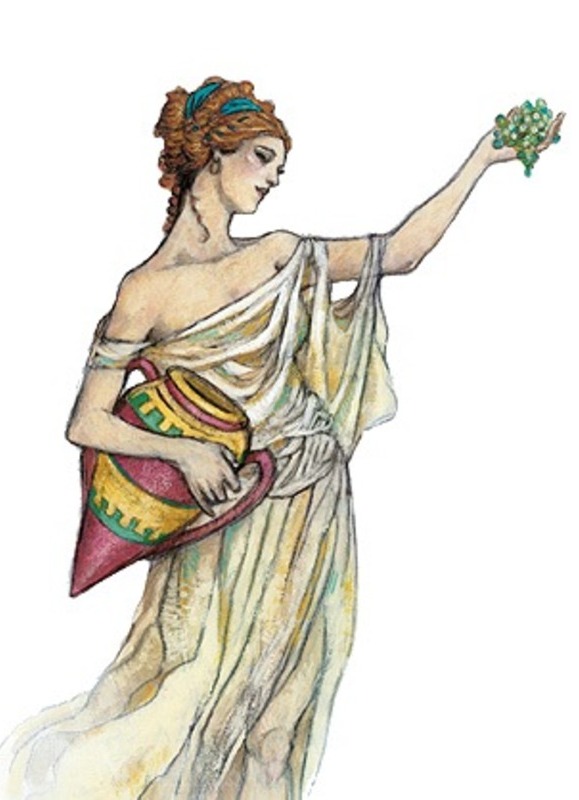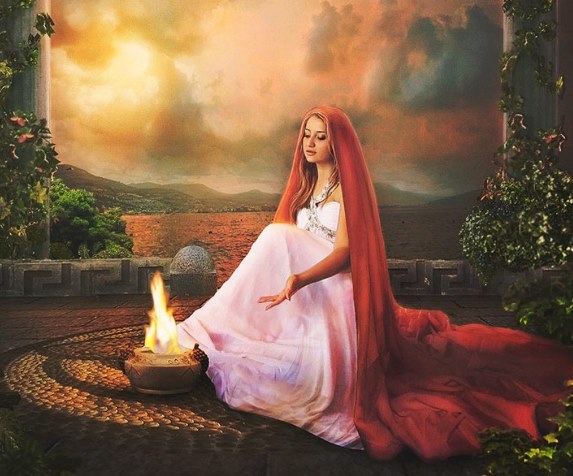Hestia — Greek mythology

Hestia
Roman name: Vesta
Hestia had three brothers and two sisters. All of her brothers and sisters had powerful jobs in the ancient Greek god world, and all were Olympians, members of the Council of 12, rulers of the gods. Her brothers were Zeus, Poseidon, and Hades. Zeus was the king of all the gods. Poseidon was the lord of the sea. Hades was the lord of the Underworld. Her sisters were Hera and Demeter. Hera was the queen of all the gods and Demeter was in charge of the harvest. Hestia was a gentle goddess, with an important job of her own. Hertia was the goddess of hearth and home.
There are not many myths about Hestia. There did not need to be. Except for Sparta, women in ancient Greece lived very similar lives. Every day, when the men went off wherever, the ancient Greek women gathered in their central courtyards to sew, to cook, or to listen to stories of the gods. They knew Hestia was watching over them. They never doubted it. It gave them great comfort. They really did not want Hestia to have a life of her own. They were very happy to have Hestia spend her time watching over all of the women in ancient Greece, even Spartan women. It gave Hestia great pleasure to do so.
Hestia had a home on Mount Olympus. She was, for a while, on the council of 12, like her brothers and sisters. But Hestia did not like arguments. One day, she asked the god Dionysus to take her seat on the council. No one has ever resigned from the council before. Zeus was not sure what to do about that. He decided that Hestia had the right to give up her seat to Dionysus.

Hestia's Name
Hestia’s name means “hearth” or “fireplace,” and her status shows how important the hearth was in the social and religious life of Ancient Greeks. Making and preserving fire was both essential and difficult for more primitive societies, which made the household fire a sacred element at a very early stage of history. In later days, Hestia became its embodiment.
Hestia’s Family
Hestia was the first-born child of the Titans Cronus and Rhea. Since she was also the first one to be swallowed at birth by her father – and, consequently, the last one to be disgorged – Hestia was oftentimes called the youngest of Cronus and Rhea’s children.
She had two sisters – Demeter and Hera – and three brothers: Hades, Poseidon, and Zeus.
The Vow of Chastity
Since fire is a pure and a purifying element, Hestia was worshipped as a virgin goddess. And they say that she became a virgin in order to keep the peace at Olympus. Namely, both Apollo and Poseidon wanted to marry her; fearing that choosing either of them may result in turmoil, Hestia swore to an eternal virginity by placing her hand on Zeus’ head. As a reward for maintaining the order and in place of marriage, Zeus granted her the central place in the house and the first and richest portion of humans’ divine offerings.
Hestia at Home
Gentle and peace-loving, Hestia doesn’t appear in too many myths. Plato says that this is because she has to remain in the house of the gods, all alone, tending the eternal celestial fire even when all the other Olympians ritually pass in processions through heavens. This is both her privilege and her predicament.
Consequently, Hestia’s only manifestation among humans was the crackling of the fire. Aristotle says that it is the sound of the goddess laughing.